Joshua Becker's Blog, page 3
March 23, 2025
The Scarcity Effect: Why We Buy More Than We Need

There’s a strange thing that happens when someone says, “Only three left in stock,” or when a sale ends at midnight, or when a product is labeled “limited edition.” Or when we hear the phrase, “But don’t wait—these are moving fast.”
Even if the item wasn’t on your shopping list a moment ago, all of a sudden, the item starts to feel important—urgent, even.
There’s a name for this: The Scarcity Effect.
This experience is, of course, not unique. You knew exactly the scenarios I mentioned in the first paragraph because you’ve heard them countless times before.
Even more, not only is the phrasing recognizable, most of us have felt the internal nudge that we should buy something now, simply because it might not be available later. We’ve bought things we didn’t need—not because we truly valued them—but because we feared missing out.
And it’s influencing more decisions than we realize.
What is the Scarcity Effect?The Scarcity Effect is a psychological principle that occurs when people place a higher value on something that is limited in availability. The less available something becomes (or appears to become), the more we desire it—whether we actually need it or not.
On some level, it makes sense. Diamonds are more valuable than rocks because diamonds are not as abundant and more scarce. But these perceptions can result in irregular or even unhealthy decision-making when the scarcity is entirely manufactured.
The principle has been studied for decades. A classic experiment from 1975 by researchers Worchel, Lee, and Adewole involved two jars of cookies. One jar held ten cookies, while the other held only two. Participants were asked to rate the cookies—and overwhelmingly, the cookies from the nearly empty jar were rated as more desirable and valuable, even though they were exactly the same.
Scarcity increases perceived value, even if the value is no different.
Marketers and retailers know this well. They create scarcity intentionally—limited-time offers, countdown timers, flash sales, exclusive collections, seasonal releases. No doubt, you’ve seen them all over the Internet and in brick-and-mortar stores. All of these tactics are designed to trigger the internal fear that if we don’t act now, we’ll miss out.
Here’s an entire article offering marketers “innovative ideas” to create scarcity and urgency, encouraging people to take quick action on an item for sale.
And so often, we act—often without thinking clearly about whether we actually need the item or not. Or whether the scarcity is true or manufactured.
The Scarcity Effect pushes us to buy things out of fear, not purpose. It clouds our judgment and convinces us that a possession is more important than it really is—just because it might not be available later. And in doing so, it creates negative effects on our lives: it empties our wallets and often fills our homes with items we never truly needed in the first place.
Not only do the items we buy clutter our physical space, they also take up our time, energy, and attention—precisely the things minimalism helps us reclaim.
How to Overcome the Scarcity EffectIt’s one thing to be aware of the Scarcity Effect. It’s another to overcome it—not just once, but as a lifestyle. But we can do both.
Here are some helpful ways to resist this all-too-common temptation:
1. Pause before purchasing.
When scarcity is used to create urgency, one of the most effective responses is simply to pause. Rarely is a purchase as urgent as the marketing claims it to be. If something is truly needed, it will still be needed tomorrow. Take 24 hours before making a decision. If the desire fades, so did the illusion of need.
“But what about the deadline?” you might ask. My mom summed it up really well when I was young. “If a salesman is pressuring you that there’s a deadline on a purchase, it’s almost never a good deal.”
2. Ask: “Would I want this if it wasn’t limited?”
Strip away the scarcity messaging and ask honestly: “Would I still want this item if it were always available at this price?” Or you can try, “Would I still want this if there were thousands of them still available?” That question might help reveal whether the desire is genuine or artificially inflated.
3. Recognize fear-based marketing for what it is.
Most scarcity-based tactics are not there to help us, they are there to manipulate us. The more we recognize phrases like “only two left” or “before it’s gone forever” as psychological tricks, the easier they are to ignore. Additionally, the more we recognize them around us almost everywhere we look, the easier it becomes to decipher which are entirely manufactured to manipulate us.
4. Focus on long-term value, not short-term emotion.
The Scarcity Effect thrives on impulse. Minimalism, on the other hand, thrives on intentionality. Long-term value should always outweigh short-term emotion. One of the best questions to ask is, “How will this item improve my life one year from now?” Or, “Will this item help me accomplish my purpose in life? Or just distract me from it?” If the answer is unclear, it’s probably not worth owning.
5. Remember: scarcity doesn’t create worth—purpose does.
It’s easy to believe that something is valuable just because it’s rare. But minimalism invites us to rethink the perceived value of almost everything. Purpose is what brings value and fulfillment into our homes and lives—not scarcity, status, deadlines, or hype. And an unneeded tool left on the shelf is more valuable than a trendy gadget collecting dust.
The Scarcity Effect is a cognitive bias that often influences our behavior—both in the pursuit and accumulation of physical things. But once we recognize it, we can begin to overcome it.
And the more we overcome it, the more intentional our lives become.
The post The Scarcity Effect: Why We Buy More Than We Need appeared first on Becoming Minimalist.
March 21, 2025
Inspiring Simplicity. Weekend Reads.

Your home is your sanctuary. Let’s keep it that way.
Simplicity is about creating space in your life for what matters most. It’s about clearing the clutter from our homes and hearts so we can live with intention and purpose.
As the world gets busier and noisier, embracing simplicity and minimalism becomes even more important.
But we all need inspiration to keep us going. That’s why I carefully selected these articles for you. I hope they inspire you to continue on this beautiful journey towards a simpler life.
Find a cozy spot, prepare your favorite drink, and immerse yourself in these thought-provoking reads this weekend.
On First Principles, Consumerism, and Why We’re All a Bit Lost | Medium by Charles Adede. Maybe fulfillment isn’t about gaining more control, but about aligning more closely with reality as it is.
The Psychology Behind Consumerism: Why Do We Buy Things We Don’t Need? | The Arabian Stories by Navida Sait. Have you ever walked into a shop intending to buy just one item but left with a basket full of things you hadn’t planned for? You’re not alone.
The Coolest People Online Are Barely Posting at All | Popsugar by Jasmine Desiree. In a world where oversharing has become the norm, a quiet counterculture is emerging: the rise of digital minimalism.
The Best Investment You Can Make: Simplifying Your Life | Simple Money by Richard James. If you want a better return on your time, energy, money, and peace of mind—start simplifying.
I Tried the 30-Day Minimalism Game and Decluttered 465 Things in One Month | Good Housekeeping by Katie Mortram. If you manage to stick to this decluttering game, it can make a big difference to all sorts of areas around the home.
8 Reasons Decluttering a Little Made a Big Difference for Me | No Sidebar by Karen Trefzger. An active life might mean that some clutter will always be entering my home. That’s why I take a few minutes each week to remove the extras.
Recently Released Inspiring Videos12 Items to Declutter That Instantly Create More Space | YouTube by Joshua Becker. If your home feels cluttered and cramped, you’re not alone. By letting go of the excess, you can quickly create more room to breathe, live, and enjoy your home.
10 Money Saving Hacks Minimalists Swear By | YouTube by Joshua Becker. Whether you want to get out of debt, get ahead financially, or start giving more, saving money is always helpful. And by shifting your mindset and habits, you can break free from the cycle of overspending and find greater financial freedom.
The post Inspiring Simplicity. Weekend Reads. appeared first on Becoming Minimalist.
March 19, 2025
20 Quotes That Will Change the Way You See Your Stuff
The physical possessions we choose to own shape the direction of our lives more than we realize. Our possessions either help us fulfill our purpose, or they distract us from it.
Every item in a home takes up space, demands attention, and requires care. The more we accumulate, the more we spend our time maintaining things rather than living life.
Unfortunately, most of us were never taught to question this. Even worse, from a young age, we have been told that more is better—that success is measured by what we own, that happiness is found in the next purchase, that security is found in full closets, full garages, and full bank accounts.
But deep down, we know we were designed for something bigger and better than physical possessions. And life is too short to waste chasing things that don’t matter. There is greater joy to be found in owning less than we can ever find pursuing more—because owning less frees us to live a more intentional and focused life.
Sometimes, a single quote is all it takes to shift our entire perspective. Just one sentence can remind us of the freedom found in letting go. Sixteen years ago, my neighbor changed my entire life with a single sentence at just the right time.
So whether you’re just beginning the journey to a clutter-free life or looking for encouragement to keep going, these quotes are here to help—because the right words, at the right time, can change everything.
1.
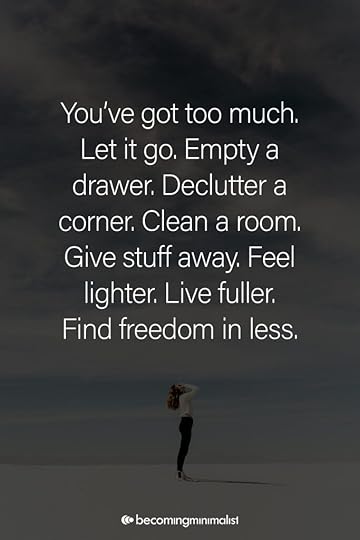
2.

3.
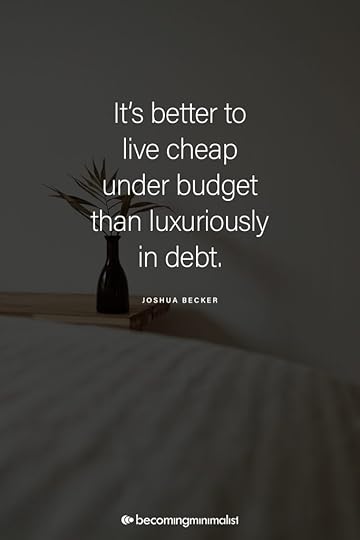
4.
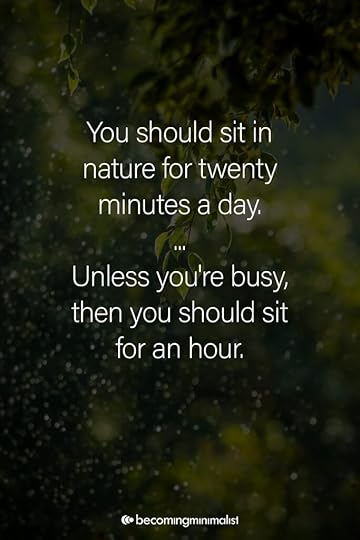
5.
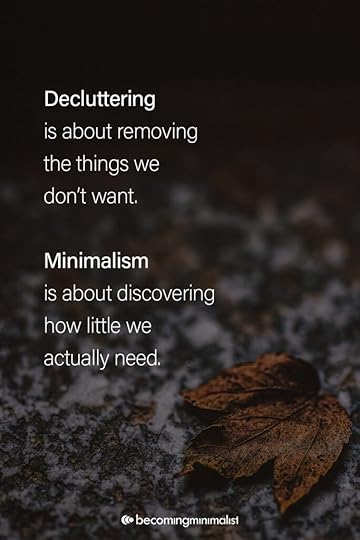
6.

7.
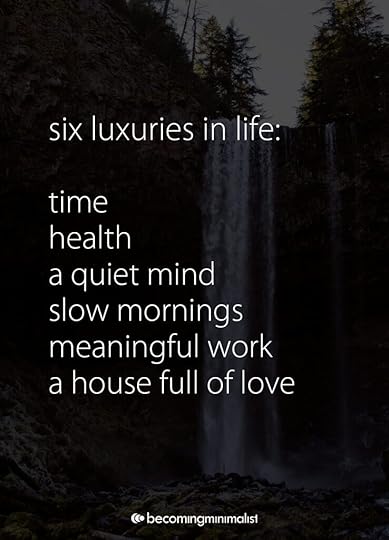
8.
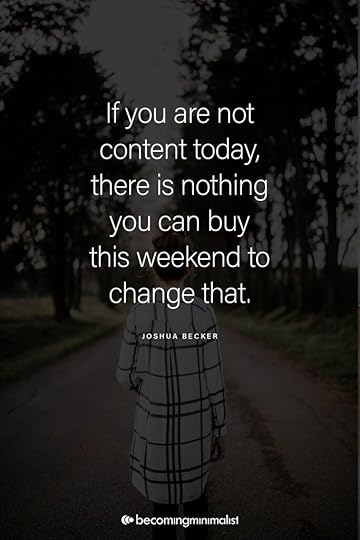
9.
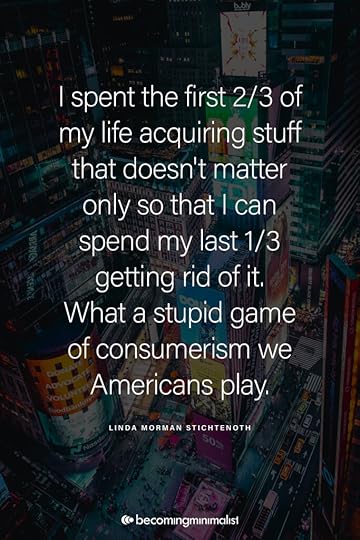
10.
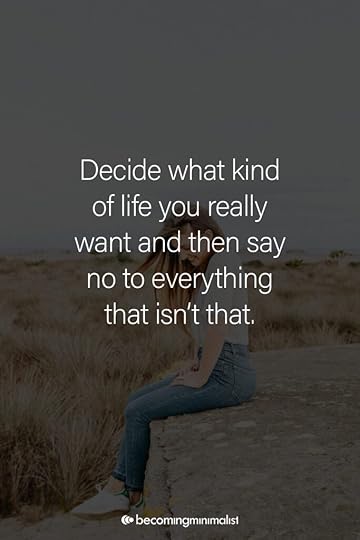
11.
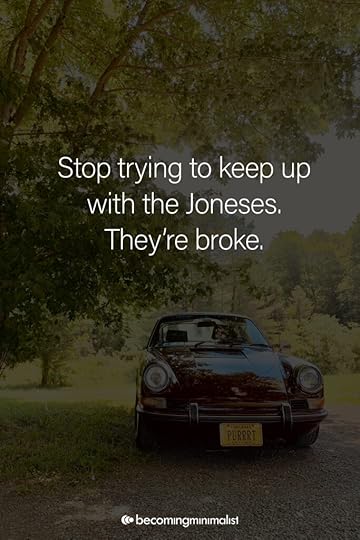
12.
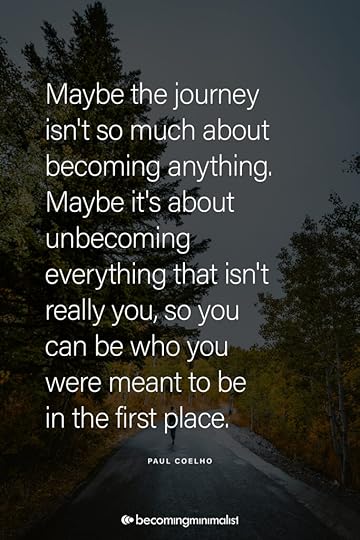
13.

14.
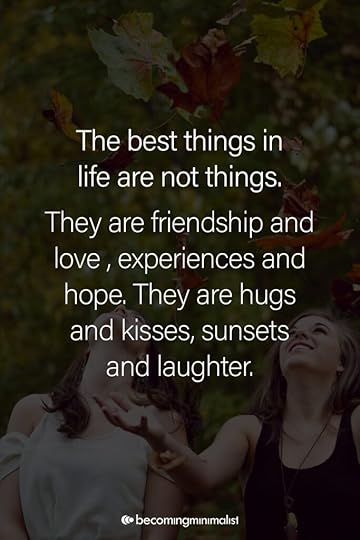
15.
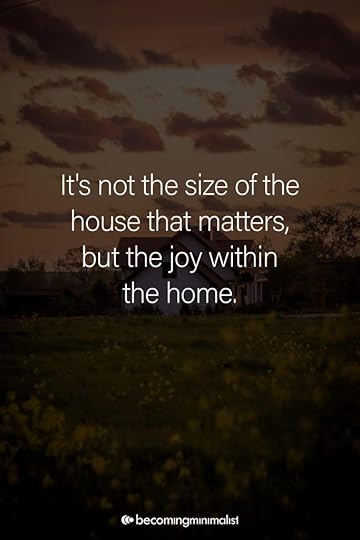
16.

17.

18.

19.
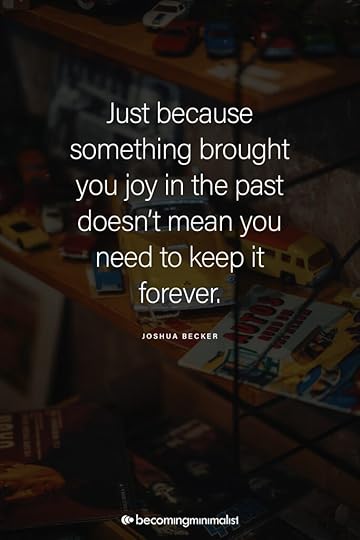
20.
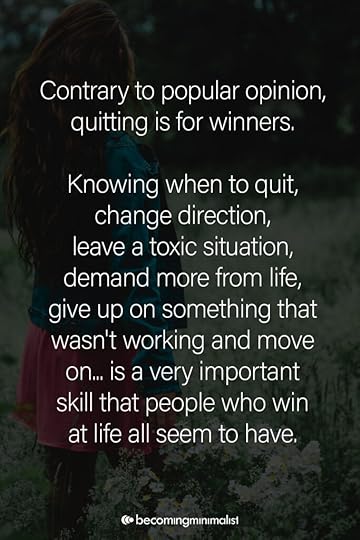
You’ll love owning less.
The post 20 Quotes That Will Change the Way You See Your Stuff appeared first on Becoming Minimalist.
March 16, 2025
The Best Time to Start Living Simply Is Now

There is an important truth about life that is helpful to understand: sometimes, the things we think will make us happy actually keep us from it.
For most of my life, I believed the ‘American Dream’ was the path to a better life—a bigger house, a fuller closet, the latest gadgets, and all the things everyone else seemed to be chasing. So I chased and accumulated those things with determination, convinced they would improve my life. But looking back, I see how many of my years were spent chasing the wrong things.
It’s not easy to admit, but much of my life was wasted pursuing possessions that didn’t matter. By the time I was 33, our home was filled with stuff—furniture, clothes, toys, gadgets, and countless items we thought we needed. Each new possession came with a hidden cost: time spent cleaning, organizing, repairing, and maintaining. Our lives were quietly being consumed by the very things we thought would bring us freedom.
Then, everything changed.
We began removing the excess—over 60% of our possessions—and in doing so, discovered a life filled with greater joy, purpose, and freedom. We found more time for faith, family, friends, and making a positive impact in the world. We uncovered passions we didn’t know we had. And we realized that the pursuit of possessions had been stealing our best years.
If I could go back, I would start living simply much earlier—in my teens, in my twenties, or as a young family. Because the earlier we embrace simplicity, the sooner we experience its life-giving benefits: less debt, less clutter, more money, more intentionality, more time and presence with the people who matter most.
The truth is, the path to simplicity looks different for everyone. Some get to learn it as a child from their parents. For others, it comes later—perhaps in a season of financial strain, a move to a smaller home, or a moment of clarity about what truly matters. Some discover simplicity as they raise young children, others discover it when they downsize after their kids have moved out. Some find minimalism through a book, a blog, a documentary, a conversation with their neighbor, or a life-changing event. Others stumble into it gradually, one small step at a time.
But no matter how or when we find it, the best time to start living simply is always now.
Here’s why starting early matters:
1. Simplicity Builds Better Habits
When we start living with less early in life, we develop habits that can shape more of our future. We learn to value experiences over things, relationships over status, and purpose over possessions. These habits can become the foundation for a life of ever-increasing intentionality and fulfillment.
2. It Frees Up Resources for What Matters
The earlier we simplify, the more time, money, and energy we have to invest in what truly matters. Imagine the impact of saving more, giving more, and pursuing passions sooner rather than later.
3. It Helps Us Avoid Regret
One of my greatest regrets is not starting sooner—wasting years and money chasing things that didn’t truly matter. I wasted too much of life chasing things that didn’t matter, only to realize later that they were distractions from what did. Starting early helps us avoid that regret and live a life aligned with our values from the beginning.
4. It Prepares Us for the Unexpected
Life is unpredictable. Simplicity equips us to handle change with grace. Whether it’s a career shift, a move, an unexpected diagnosis, or even a global health crisis, living with less means we’ve found freedom to help us be better prepared to adapt and thrive.
5. It Sets an Example for Others
When we choose simplicity, we inspire those around us—our children, friends, and community. We show them that a meaningful life isn’t found in what we own but in how we live. And the earlier we can start showing that truth to our kids, the more likely they are to believe it.
The beauty of simplicity is that it’s never too late to start—no matter where you are in life. Whether you’re 20, 40, 60, or 80, the benefits are waiting for you and able to be enjoyed just as soon as you want. But the earlier we begin, the sooner we experience them and the more time we have to enjoy them.
So, where do we start?
Begin small. Declutter a drawer. Cancel a subscription. Say no to something that doesn’t align with your values. Each small step builds momentum and brings clarity.
The best time to start living simply is now. Don’t wait for the ‘right’ moment or perfect circumstances. Start today, and create a life you’ll never regret.
The post The Best Time to Start Living Simply Is Now appeared first on Becoming Minimalist.
March 12, 2025
What Do You Want More of in Your Life?

We are not infinite gods. We are finite creatures. And because of that, all of our life resources are finite. Our days are finite. Our money is finite. Our time and attention and energy are finite.
The abundance of these resources may vary from person to person, but for all of us, they are limited.
And because of that, every “more” comes with a tradeoff. More of one thing always means less of something else.
In some areas of life, this is easier to see:
More junk food means less health.
More screen time means less time outside.
More spending means less savings.
More late nights means less enjoyable mornings.
More clutter means less calm.
But in other areas of life, we are less likely to notice or consider the full cost:
Wanting more money means less energy for more significant pursuits.
Wanting more career success means fewer family dinners.
Wanting more power means less freedom.
Wanting more status means less peace.
Wanting a bigger house means less time playing with your kids.
Wanting more comfort means less personal growth.
Because we are finite creatures, we can have more of anything. But not more of everything.
That’s why it’s important to decide—intentionally, deliberately, and thoughtfully—what we want more of.
And if we don’t choose our “more” carefully, the world will choose for us. And it rarely chooses well.
The things that matter most are often quiet. They don’t clamor for attention. They don’t shout from billboards or flash on screens. But they are what we most desire in our deepest heart: purpose, peace, love, presence, meaning, connection, contribution.
Those items are always worth choosing. And always require us to choose less of something else.
So let’s be sure to ask ourselves the most important questions:
What do we want more of in our lives?
And what are we willing to have less of so we can make room for it?
Because life is too short to chase the wrong more.
The post What Do You Want More of in Your Life? appeared first on Becoming Minimalist.
March 9, 2025
The Amplification of Joy and the Diminishing Marginal Utility of Things
Note: This is a guest post by Joshua Fields Millburn of The Minimalists.

My friend Derek wanted to be a good minimalist. So after his son, Sammy, was born, he refused to buy toys for the boy, assuming he would be just as happy playing with the rocks and sticks strewn throughout their backyard.
A few years later, however, my friend started questioning his own minimalism when he saw his son erupt with joy each time he played with his friend’s toys. Sammy smiled while he constructed deformed dinosaurs with multicolored LEGO bricks. He laughed as two Ninja Turtles performed backflips and ate plastic pizza slices. And he literally jumped with joy the first time he slammed a NERF ball into its door-frame hoop.
Derek realized he had been denying Sammy in the name of minimalism—dampening his boy’s playtime with his own preference for simple living. So he did what many loving fathers might do: he logged onto Craigslist and found a big box of used toys.
When Sammy opened the box, his facial features expanded with delight. He extracted his new toys one at a time—a Walkie Talkie, an Etch A Sketch, a miniature Wright Flyer model airplane—welcoming each with gratitude.
Yet at the sight of Sammy’s glee, Derek was overtaken not by triumph, but by the consumerist mindset: If one box made him this happy, then ten boxes will surely make him ten times happier.
As Derek returned to Craigslist, an insight from his past interrupted his next transaction: This was exactly how I behaved before becoming a minimalist. Instead of enjoying the things in front of me—instead of being satisfied with my treasure—I always searched for more.
He looked over at his son and noticed that Sammy was fully present, free from the yearning that is chaperoned by consumerism. The shopper’s delirium that had always removed Derek from the joy of the moment was absent from the boy. Sammy was simply happy with the toys that were in front of him.
It occurred to Derek that the new toys didn’t make his son happy—they intensified the joy that had been there, in his heart, all along. The toys acted as an amplifier of joy, not the source of it.
Derek looked back at his computer and had an aha moment: Ten times the toys didn’t equate to ten times the joy. In fact, more toys might distort Sammy’s innate happiness because, much like a stereo amplifier, every sound turns into noise when the volume is cranked all the way up.
In economics, this overamplification is known as the law of diminishing marginal utility, which states that an item’s total utility increases more slowly as consumption increases, until, eventually, a point is reached at which consumption yields negative utility.
Accordingly, zero toys was a type of deprivation. That’s why the first box generated considerable utility. And yet a warehouse worth of toys would be another kind of deprivation—an overabundance that would strip away the peacefulness of playing in the present.
Instead of making another purchase, Derek shut his laptop and admired his son’s exuberance. Depriving Sammy was not a minimalist move; it was a legalist edict that had accidentally silenced his joy. But when Derek let go of his stringent regulations, the suppressor was removed and joyfulness echoed throughout their home.
***
Joshua Fields Millburn is a New York Times–bestselling author, Emmy-nominated Netflix filmmaker, podcaster, and the founder of the simple-living collective The Minimalists.
.
The post The Amplification of Joy and the Diminishing Marginal Utility of Things appeared first on Becoming Minimalist.
September 29, 2024
A Life-Changing Truth: We’re All Minimizing Something

“The whole of life is but a moment of time. It is our duty, therefore, to use it, not to misuse it.” —Plutarch
“I could never become a minimalist.”
This is a phrase I have heard countless times since starting this blog.
Every time, two thoughts come to mind. First, I wonder what misconception they have about minimalism that would make it seem so difficult. But second, more importantly, I think to myself, “But you already are a minimalist—you just don’t know it yet.“
The truth is, we’re all minimizing something in our lives, whether we realize it or not. And once we understand that fact, everything about us begins to change.
Every day, we make choices about where we spend our time, money, energy, and attention. By definition, these resources are limited. Even if we were the richest man or woman on earth, there is still only a finite amount of money and time available to us. It is impossible to do or have everything.
All of life is a trade. Every minute of every day, we trade for something. And if we’re not minimizing our possessions, we’re minimizing something else.
When I first embraced minimalism, I thought I was just motivated to declutter our home so I could spend more time with my kids. But I quickly realized minimalism was about more than that.
Minimalism was about finding more intentionality with my resources.
It wasn’t just about removing things from my home. It was about making better choices with my life.
When we began to own less, we found more time for the things we love. More energy for pursuits that matter. More focus for what brings real meaning. More money for service and generosity. We even found more opportunity to focus on self-growth and personal development.
When we began minimizing possessions, we began maximizing more important things.
That is always the case!
We are all trading something every day. We are spending money on something, we are spending time somewhere, we are focusing our energy and affections in a specific direction.
And if we’re busy chasing and accumulating physical possessions we don’t need, we’re minimizing resources that could be spent elsewhere. But most of the time, we don’t even realize it.
There is a direct correlation between the increase in our physical possessions and the decrease in our resources to be spent elsewhere.
Make no mistake, everybody is living a version of minimalism. The question is, are we minimizing the right things?
The post A Life-Changing Truth: We’re All Minimizing Something appeared first on Becoming Minimalist.
September 27, 2024
Inspiring Simplicity. Weekend Reads.

My desire with each Weekend Reads is to provide you with articles and posts that encourage simplicity and minimalist living. Below, you will find links to blog posts and news stories that I hand-picked over the last couple weeks. I hope you find inspiration and practical help inside them.
That is my goal on Becoming Minimalist: to intentionally promote simplicity in a world that needs to hear it.
An Ode To Simple Living: A Summer Spent With My Grandparents | Strike Magazine by Hannah King. I know what you’re thinking: You lived with your grandparents as a 21-year-old college student for 3 months?! Yes. And I can confidently say it was one of my best decisions this summer.
14 Qualities That Define a Minimalist Person | The Minimalist Vegan by Michael Ofei. Minimalists are frequently viewed as emotionless, privileged, dull, clinical and extreme. Yet some of the most exciting and dynamic individuals in history practised minimalism.
The Weight of Less: Redefining Minimalism Beyond Things | Manu Sharma. To truly understand minimalism, we must shift the focus from material things to a much deeper inquiry: why do we keep accumulating in the first place?
Stop Trying to Keep Up with the Joneses—They’re Broke | Simple Money by Richard James. Trying to match the lifestyle of others can quickly become a financial disaster.
Becoming Minimalist’s Joshua Becker: 3 Benefits of Minimalist Budgeting for Your Wardrobe | Yahoo by Ellie Diamond. What would it be like to slow down? To find stillness in your day, moments of rest and quietude?
10 Things You Should Stop Buying Today for a Simpler Life | No Sidebar by No Sidebar. By letting go of some specific buying habits, we can create more space—both physically and mentally—and focus on what truly matters.
Recently Released Inspiring Videos20 Simple Ways to Find a Moment of Peace | YouTube by Joshua Becker. Even when life is chaotic, we always have small opportunities to make peace and quiet a part of our lives. Here are some easy ways to find peace daily and slow life down.
The Zeigarnik Effect: The Hidden Reason Your Mind Feels Cluttered | YouTube by Joshua Becker. We all feel scatterbrained from time to time, but if you’re feeling it lately more than usual, you may be overlooking this common culprit.
The post Inspiring Simplicity. Weekend Reads. appeared first on Becoming Minimalist.
September 26, 2024
15 Super Helpful Decluttering Tips for Busy People

One of the most life-changing benefits of owning fewer possessions is the gift of more time. No doubt many of you have already experienced that. When we own less, we spend less time cleaning, organizing, maintaining, repairing, replacing… even shopping for new things in the first place.
Life becomes more manageable and less overwhelming at home (and in the world). In fact, the sheer amount of time saved by owning less surprises almost everybody who becomes minimalist. It’s impossible to realize how much of a burden our possessions have become until we begin to remove them.
But, when you’re just starting out on the journey to become minimalist, it can feel like the opposite is true. It feels like you’re adding more things to do to an already busy schedule. When you’re working a full-time job, raising kids, managing a home, attending family commitments, AND partaking in a few hobbies, the thought of finding extra time to declutter feels impossible for many.
Despite the obstacles, it is so worth the effort.
It might take you a little bit longer to minimize than someone who has more free time, but here are 15 practical, decluttering tips to help you get started:
1. Start Small and VisualYour first step in the right direction doesn’t need to be a big one. So pick a starting area that has a noticeable impact but won’t take much time. A medicine chest, your nightstand, shelving in your living room, maybe a kitchen countertop are all great starting points. These are spaces we see frequently, and clearing them can create a quick visual win, fueling motivation to keep going.
2. Use “In-Between” MomentsDecluttering doesn’t always require long stretches of time. Use spare moments—like while waiting for dinner to cook or during commercial breaks—to tidy a small drawer, a shelf, or your desk. Done consistently, these quick actions will add up.
3. Schedule Decluttering TimeFor larger projects, carve out specific time in your week, like a Saturday morning or an hour in the evening after the kids go to bed. If you live a busy life, you probably live by the calendar anyway. There are some projects that just require a period of time—so schedule them in and use your time efficiently when you do.
This will be the hardest at first. But like I mentioned, you’ll be surprised how much time decluttering grants you back when it’s completed. After scheduling just a few of these sessions at the beginning, you’ll find it easier and easier.
4. Declutter As You GoThink of looking for items to declutter as an intentional part of your daily routine. For example, if you try on clothes and decide not to wear them because you don’t like the fit or color anymore, don’t toss them back into the closet—place them in a donation pile immediately. Same with toiletries or self-care products that you just can’t find the motivation to use.
5. Set Aside 10 Minutes Each EveningAs part of your bedtime routine, plan on a 10-minute decluttering session somewhere on your way to bed. For example, start by spending 10 minutes in the living room where you watch TV. Or ten minutes in the bathroom where you get ready for bed. Or ten minutes decluttering an area in your bedroom. Ten minutes per day, consistently, will make a huge impact in just a week.
6. Focus on Frequently Used AreasIn the earliest stages, focus on decluttering spaces that you interact with daily—like your kitchen or bedroom or closet. Decluttering these areas will make your day run more efficiently right at the beginning.
7. The “One-In-One-Out” RuleFor every new item you bring into your home, remove one that’s no longer needed. If you have a lot of decluttering to do, use the “One-In-Two-Out” variation. This commonly-used trick will force you to make progress even when you don’t feel like it.
8. Adopt a “No-New-Purchases” RuleIf you like the idea of “One-In-One-Out” Rule, go for it! But another decluttering tip for busy people is to temporarily commit not to buy anything until your current decluttering project is complete.
There are many people who have changed their lives through a No-Spend Month or a No-Spend Year (this doesn’t usually apply to consumables like food).
I’m not saying you need to do this as part of your decluttering. But deciding specifically not to buy anything new until your decluttering is done will make your decluttering both easier (less stuff coming in) and faster (because of the incentive to finish).
9. Declutter A Little Before You Sit DownI learned a life-changing concept several years: A do-it-before-you-sit-down approach to getting stuff done at home. You can read more of the practice here. But the principle is simply this: As soon you get home in the evening, before you sit down to relax, do at least a little bit of decluttering somewhere in your home.
10. Learn Helpful Questions to AskWhen decluttering on a schedule, it’s important to focus on efficiency. So find those questions that help you make quick progress removing things from your home. You might want to try: Do I need this? Does this item help my home function better? Is this just a duplicate of something else? Why do I have it? What would I use if I didn’t own this?
The question that works best for you might be different than the question that works for someone else. So try out a few. And zero in on the one that helps you make the best progress.
11. Donate on Your CommuteKeep a donation box in your car. As you declutter, place unwanted items directly in the box. The next time you drive by a donation center—whether on your way to work or running errands—drop it off. This 1) saves you time; 2) keeps clutter from building up in your home; 3) and helps with the most important step of the decluttering process: actually removing the things from our possession.
12. Hire HelpIf you’re feeling overwhelmed, there’s no shame in hiring some help. Most people who hire decluttering help do so because 1) They don’t know how to do this on their own; or 2) They don’t have the time to do it themselves. I have personally trained over 50 professionals and individuals in my strategy and approach to own less. I recommend any one of them: Becker Method Certified Declutterers.
Even having a friend or family member help can make the task feel lighter and faster.
13. Keep the Right MindsetRemind yourself that every minute spent decluttering pays off in the long run. For every minute you spend minimizing, you’re likely saving yourself an hour of future cleaning, organizing, or searching for misplaced items. Think of your decluttering time as an investment—and find motivation in that mindset.
14. Temporarily Cancel a Recurring AppointmentHere’s the good news: There is a finish line to your decluttering journey. You may need to make an intentional change in your regular weekly or monthly schedule for now, but that change won’t last forever. Once you declutter your home, you’ll be able to add that appointment back in your life plus more if you want.
15. Involve the Whole FamilyDecluttering doesn’t have to be a solo activity. Involve your family members, especially if they contributed to the clutter. Set a timer for 20 minutes and see who can declutter the most in that time. Making it a family project can lighten the load and speed up the process.
Of course, I’m not expecting you to use all 15 of these tips—you’ve got enough on your plate already!
But finding just 2 or 3 that fit naturally into your busy lifestyle will help you make the progress you’re looking for. With each small step, you’ll notice the difference in your home and, more importantly, in your life.
The post 15 Super Helpful Decluttering Tips for Busy People appeared first on Becoming Minimalist.
September 22, 2024
Decluttering is Great. Reassessing Your Life is Even Better.

So you want to declutter your home? Awesome! I highly recommend it.
When you declutter your stuff, you find that your home improves because the environment feels more calm, visual noise is removed, things are easier to find, and you might even sleep better at night.
And those are all really good things. I wish you all the best in your decluttering journey because it will change your life for the better! In fact, if you are looking for some practical ideas to get started, try these articles:
The Simple Guide to a Clutter-Free HomeGo Ahead. Start Decluttering with the Easiest Step.A Guide to Creating a Minimalist HomeDecluttering is wonderful! But there’s something I want you to know:
Decluttering is great. But reassessing the role of possessions in your life is even better.
Let me explain what I mean.
When we decide to declutter our homes, we’re usually focused on the immediate benefits: a cleaner room, less stuff around us, a home that’s easier to manage, greater efficiency in our day-to-day lives.
But there are even greater benefits to be found! Because the process can change everything about us!
When we reevaulate the entire role that possessions play in our lives and affections, we open ourselves to deeper and richer life-change. And that is where the greatest opportunity resides—not just in decluttering items from our home, but reevaluating our stuff entirely.
When we first decided to become minimalist, I was drawn to the simple idea of “spending less time cleaning.” After a long Saturday cleaning out my garage, at the expense of spending time with my then 5-year-old son, I could see how fewer things in my garage would have made the chore easier.
But the more stuff we got rid of, the more I began to question its origins.
Why, for example, did I have a garage full of stuff in the first place?
Why were our closets crammed full? Why were the kitchen cabinets overstocked? Why was the basement full of boxes and boxes of stuff?
How come I could take three mini-van loads of clutter to our local donation center and still feel like I was only scratching the surface?
Why did we buy SO MUCH stuff that we didn’t need? And, at the same time, be living paycheck-to-paycheck? If we were so stressed about money, why did we accumulate so much stuff we didn’t need?
What was driving my thinking? What was motivating my decisions? And what was dictating my worldview to such an extent that we felt trapped but couldn’t find the escape?
Yes, decluttering our stuff felt great. We eventually removed 60-70% of our things.
But the real transformation came when we started to rethink the role that possessions played in our life. Suddenly, this process became about more than just owning fewer things; it was about re-evaluating how much importance I placed on those things in the first place.
As you know, we live in a culture that constantly tells us we need more: bigger homes, fancier cars, trendier fashion, better toys, the latest technology. Marketers scream at us from every available screen and surface. And over time, their messaging changes us.
They convince us—as much as we want to argue they don’t—that our lives will improve if we spend our money, time, and energy buying the products they produce.
And without thoughtfulness and intentionality, they determine the lives that we live. They shape the society around us—and then they shape us as individuals.
We can see this effect on our small purchases: clothes, gadgets, trinkets, toys, and decorations (just to name a few). But we can also see this effect in larger purchases: bigger homes, newer cars, and the latest technology.
But every single purchase we make requires more of our life. And often, rather than improving our life, they distract us from the things that matter most.
If we declutter our homes, but don’t wrestle with the beliefs and worldview that led to all that clutter in the first place, we’ll just fill our homes back up again. And in the process, waste more of our money, time, and energy.
But when we reevaluate our possessions and shift our mindset, we discover the freedom that comes with wanting less. No longer do we feel the need to compete with others or keep up with societal expectations. Instead, we can focus our time and resources on what truly matters—whether it’s building relationships, pursuing meaningful work, focusing on spirituality, or reaching our life’s fullest potential.
And that is where the real benefits are found!
Decluttering is great, no doubt about it. But reassessing the role possessions play in your life is even better.
The post Decluttering is Great. Reassessing Your Life is Even Better. appeared first on Becoming Minimalist.



